PMS Bazaar recently organized a webinar titled “The Accreditation Edge: Unlocking the Power of Accredited Investors to make Diversified Investments,” which featured Mr. Archit Lohia, Founder and CEO of Career Topper Online Education Pvt. Ltd. This blog covers the important points shared in this insightful webinar.
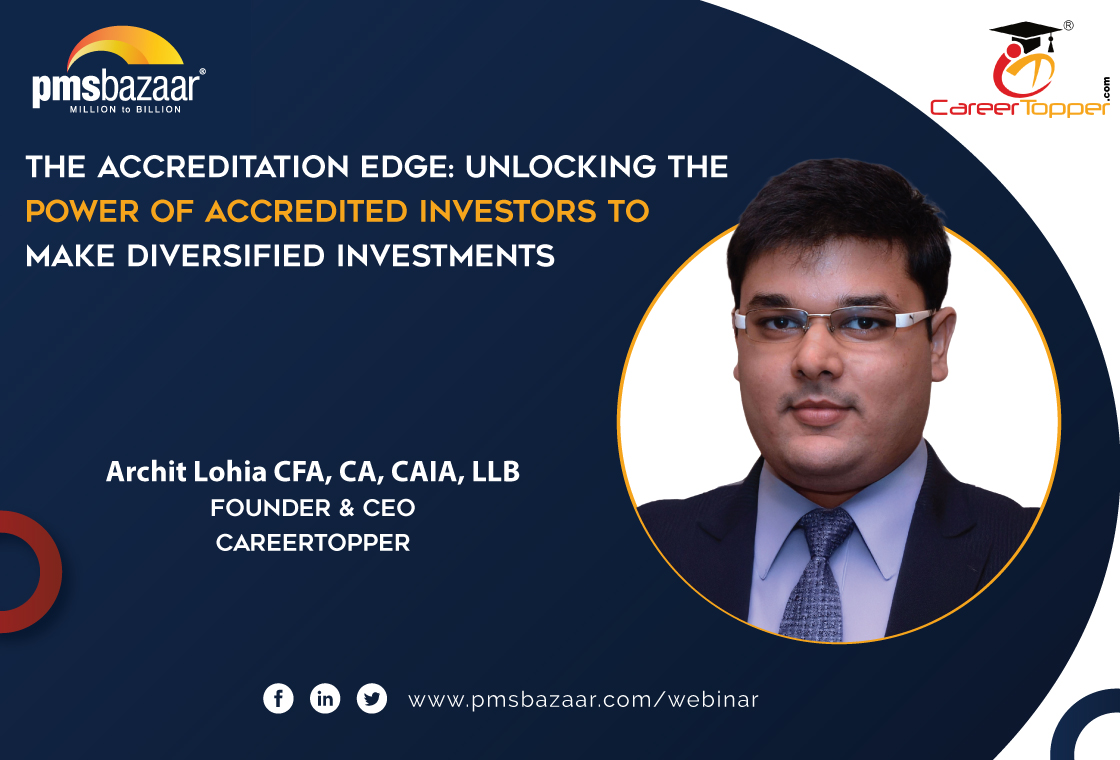
The webinar blog covers insights from Mr. Lohia, which includes his insights on SEBI’s accredited investor framework, its need, eligibility criteria, and benefits for high-net-worth investors in India. It explains how accreditation lowers investment thresholds, enables diversification, and offers access to exclusive opportunities. The piece also discusses global precedents, recent SEBI reforms, streamlined certification processes, required documents, and costs, emphasising growing opportunities for sophisticated investors.
Key aspects covered in this webinar blog are
- The need for investor accreditation is highlighted as a crucial step for HNIs.
- Global precedent and local evolution show how India is aligning with global practices.
- Eligibility criteria for accreditation are clearly defined for individuals and entities.
- Key benefits of investor accreditation include lowered thresholds, diversification, co-investment opportunities, bargaining power, and reduced accountability.
- Recent developments and future prospects indicate SEBI’s plans to expand accredited investor participation.
- Streamlining the accreditation process makes certification faster and more convenient.
- Required documents and costs outline the paperwork and fees involved for individuals and entities.
Mr. Archit Lohia, started by noting the growing importance for investors to understand the concept of accreditation and its potential benefits. He observed that India is on the brink of a significant change, and high-net-worth (HNI) investors are in a prime position to capitalize on the new reforms introduced by the Securities and Exchange Board of India (SEBI).
The Need for Investor Accreditation
Mr. Lohia provided a striking example of the gap between potential and reality. While approximately eight crore households and up to nine lakh unique investors in India are eligible for the accredited investor framework, only around 800 accreditation certificates have been issued so far. This disparity highlights a significant lack of awareness, which he sought to address.
He explained that the accreditation framework was introduced to create a distinct service for a specific class of investors—those who possess the necessary financial knowledge and a higher risk-taking capacity than retail investors. This initiative by SEBI recognizes the changing landscape of Indian finance, where the per capita GDP has more than doubled in the last five years, leading to a noticeable increase in the risk appetite of investors. Seasoned investors, who have been in the market for decades, are now looking to diversify beyond traditional mutual funds and permanently allocate capital to alternative asset classes.
Mr. Lohia stated that SEBI's approach is justified, as professional portfolio managers are often appointed to manage the portfolios of HNI investors. He mentioned that it is more difficult to mislead or misrepresent performance to an HNI investor than to a retail investor. Therefore, SEBI believes it's essential to give these sophisticated investors a special designation or “tag” that of an accredited investor—to grant them certain regulatory benefits.
Global Precedent and Local Evolution
Mr. Lohia highlighted that this concept is not new and is well-established in global financial markets, including the US, Singapore, the European Union, and Mauritius. These countries have long defined accredited investors and offered them specific regulatory advantages. He drew a parallel, stating that SEBI's first step is to formally identify this class of investors, with the second step being the introduction of new, customized investment products.
He mentioned the recent launch of Specialized Investment Funds (SIFs) by several mutual fund companies, designed for accredited investors. While minimum investment sizes for various products are typically ₹10 lakhs for SIFs, ₹50 lakhs for Portfolio Management Services, and ₹1 crore for Alternative Investment Funds, he explained that accreditation aims to lower these barriers. By becoming accredited, investors can gain access to high-risk, high-return asset classes with more flexibility.
Eligibility Criteria for Accreditation
Mr. Lohia detailed the three primary eligibility options for individuals, sole proprietors, and Hindu Undivided Families (HUFs):
- Option 1: A net worth of over ₹7.5 crore, with at least ₹3.75 crore in financial assets. Financial assets include liquid investments like gold, stocks, and unlisted pre-IPO shares, but not one’s primary residence.
- Option 2: An annual income of more than ₹2 crore. This can be the combined income of an individual and their spouse.
- Option 3: A combination of a net worth of over ₹5 crore and an annual income of more than ₹1 crore. Of the net worth, at least ₹2.5 crore must be in financial assets, again excluding the primary residence.
He also outlined the criteria for other entities:
- Trusts: Must have an Assets Under Management (AUM) of over ₹50 crore.
- Companies or LLPs: Must have a net worth of at least ₹50 crore, as shown in the latest balance sheet.
- Partnership Firms: All individual partners must independently meet one of the three criteria for individuals.
Mr. Lohia compared India's criteria with those of other countries. He noted that the ₹7.5 crore net worth requirement was initially set to replicate the US's $1 million threshold when the dollar-rupee exchange rate was around ₹75. He mentioned that these values are likely to increase over time with currency fluctuations and rising investor risk appetite.
Key Benefits of Investor Accreditation
Mr. Lohia elaborated on the significant benefits of becoming an accredited investor.
- Lowered Investment Thresholds and Diversification
A key advantage is the reduction of minimum investment requirements for AIFs, PMS, and SIFs. An accredited investor can, for instance, invest in five different AIF strategies with a ₹20 lakh ticket size each, instead of putting the entire ₹1 crore into a single AIF. This allows for better portfolio diversification, mitigating concentration risk.
- Access to Co-investment Opportunities
Accreditation provides access to new investment avenues like angel funds and, most importantly, co-investment vehicles. These are special purpose vehicles created by AIFs to allow HNI investors to invest alongside them in pre-IPO companies. This gives accredited investors the opportunity to buy shares at a discounted price compared to the IPO price and formalizes a market that was previously considered risky. He cited the example of an investment in a pre-IPO company that later listed at a much higher price, demonstrating the potential for substantial returns.
- Enhanced Bargaining Power and Customized Products
Accreditation bolsters an investor's bargaining power. An accredited investor can negotiate for a lower management or incentive fee with a fund manager. This is possible because their accredited status, certified by a KRA agency under SEBI, adds to their reputation and credibility. Furthermore, SEBI is encouraging the creation of customized products for accredited investors, such as the Specialized Investment Funds, which offer the flexibility of Category III AIFs with the tax benefits of mutual funds.
Recent Developments and Future Prospects
Mr. Lohia concluded by discussing recent proposals from SEBI aimed at further boosting the accredited investor framework. A key development is the proposed launch of AIF schemes exclusively for accredited investors. These schemes would remove the cap of 1,000 investors per fund, allowing for broader participation. Furthermore, these funds would offer accredited investors differential rights, enabling them to negotiate customized terms, such as lower fees or exclusions from specific investment sectors.
He also mentioned that the managers of these AIFs will be exempt from the NISM exam, and trustees will not need to be appointed, providing more freedom and flexibility. These changes are designed to empower HNI investors, allowing them to participate more directly in the private markets. According to Mr. Lohia, the core message is that SEBI is actively working to formalize HNI participation in private markets through the accredited investor framework, providing investors with more bargaining power, customization, and opportunities.
Streamlining the Accreditation Process
Mr. Archit Lohia explained that the process of obtaining an accredited investor certificate from KRA agencies like CVL or NDML, which typically takes two to three weeks, is being streamlined by SEBI. He said that investors can now give soft commitments to their fund managers and begin the investment process without having the certificate in hand, on the promise that they will obtain it shortly. He noted that the actual investment amount can only be remitted after the accreditation certificate is issued. This development is part of the government's "ease of doing business" initiative, making the timeline more convenient for both managers and investors.
Required Documents and Costs
For individuals, he listed the necessary documents as common ID proofs (PAN, Aadhaar, Passport), a net worth certificate from a practicing Chartered Accountant, income tax returns, and Demat account statements. For companies and LLPs, additional documents such as the Certificate of Incorporation, MOA, AOA, and a net worth certificate from the company's statutory auditor are required. Mr. Lohia also detailed the costs, mentioning a ₹5,000 processing fee and a certification fee of ₹5,000 for a two-year validity or ₹9,500 for a three-year validity. He emphasized the importance of a longer validity period to allow for portfolio reshuffling and diversification.
Mr. Lohia covered all the topics mentioned above in-depth and answered questions from the audience toward the end of the session. For more such insights on this webinar, watch the recording of this insightful session through the appended link below.
Get access to rich data and analytics of PMS & AIF by subscribing to us. Join the 75000+ investors & experts: Subscribe NOW
Recent Blogs

January Rout, Extreme Dispersion: PMS Returns Swing From Losses to Gains
Benchmark falls deepened losses, but multi-asset and debt cushioned portfolios meaningfully
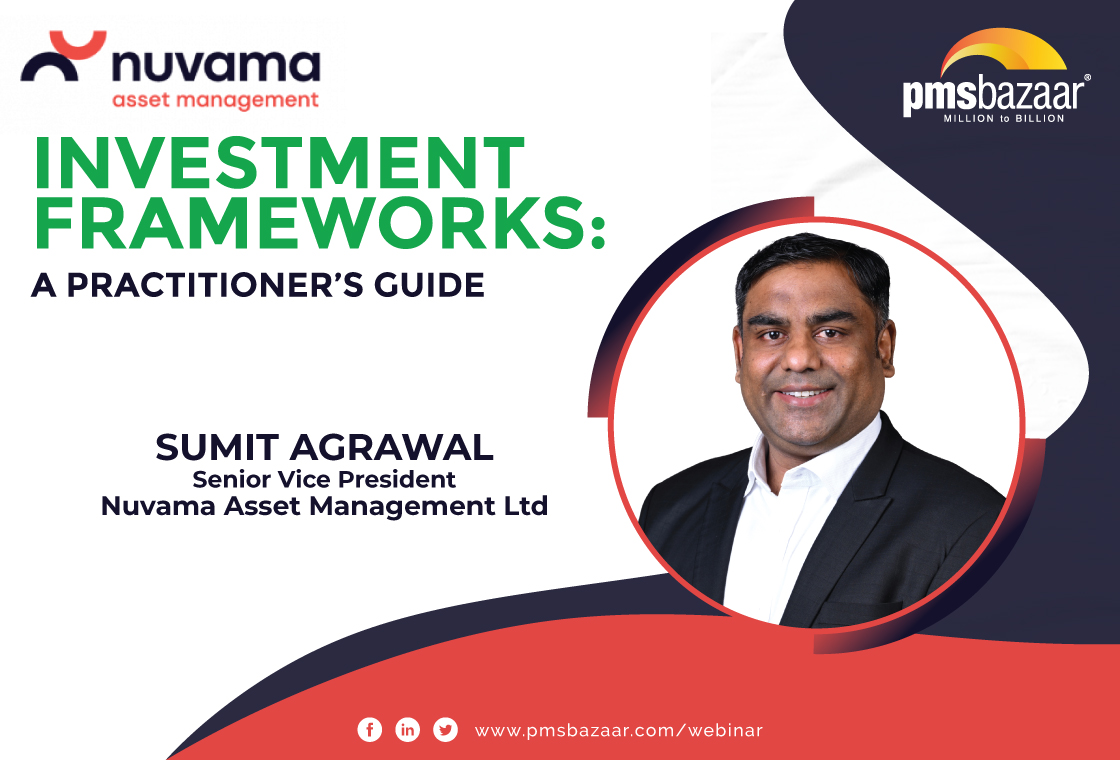
Investment Frameworks : A Practitioner’s Guide
PMS Bazaar recently organized a webinar titled “Investment Frameworks: A Practitioner’s Guide,” which featured Mr. Sumit Agrawal, Senior Vice President, Nuvama Asset Management Limited. This blog covers the important points shared in this insightful webinar.
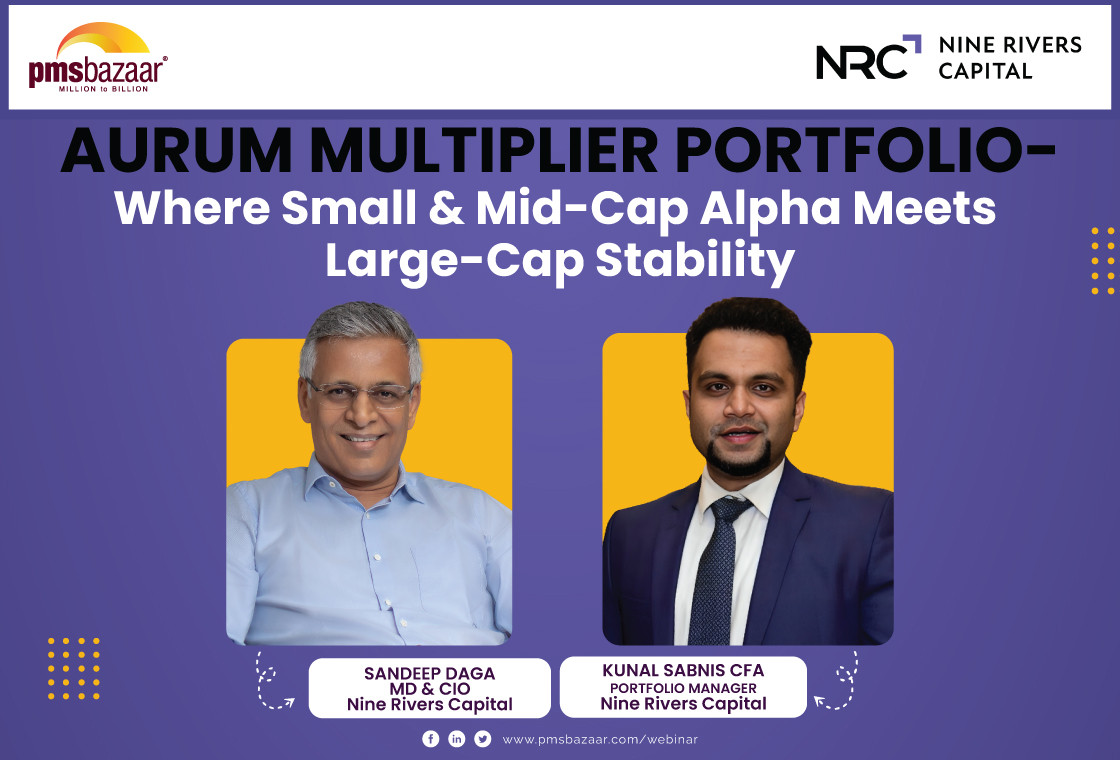
Aurum Multiplier Portfolio - Where Small and Mid-Cap Alpha Meets Large-Cap Stability
PMS Bazaar recently organized a webinar titled “Aurum Multiplier Portfolio - Where Small and Mid-Cap Alpha Meets Large-Cap Stability,” which featured Mr. Sandeep Daga, MD& CIO, Nine Rivers Capital and Mr. Kunal Sabnis, Portfolio Manager, Nine Rivers Capital. This blog covers the important points shared in this insightful webinar.

Flat Markets, Wide Outcomes: How 484 PMS Strategies Performed in Dec 2025
December 2025 was a month where market returns stayed close to flat, with the Nifty 50 TRI at -0.28% and the BSE 500 TRI at -0.24%.
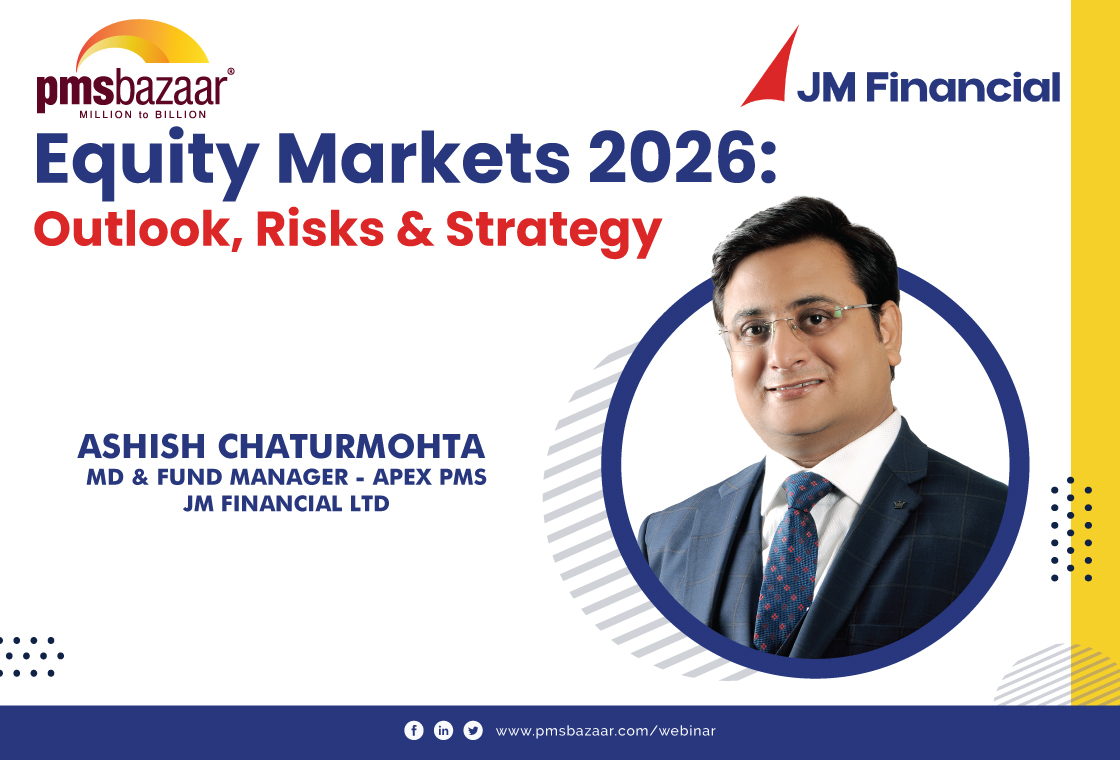
Equity Markets 2026: Outlook, Risks and Strategy
PMS Bazaar recently organized a webinar titled “Equity Markets 2026: Outlook, Risks and Strategy,” which featured Mr. Ashish Chaturmohta, MD & Fund Manager – APEX PMS, JM Financial Limited. This blog covers the important points shared in this insightful webinar.

MICRO CAPS: The Dark Horses of the Indian Equity Market
PMS Bazaar recently organized a webinar titled “MICRO CAPS: The Dark Horses of the Indian Equity Market,” which featured Mr. Rishi Agarwal and Mr. Adheesh Kabra, both Co-Founders and Fund Managers, Aarth AIF. This blog covers the important points shared in this insightful webinar.
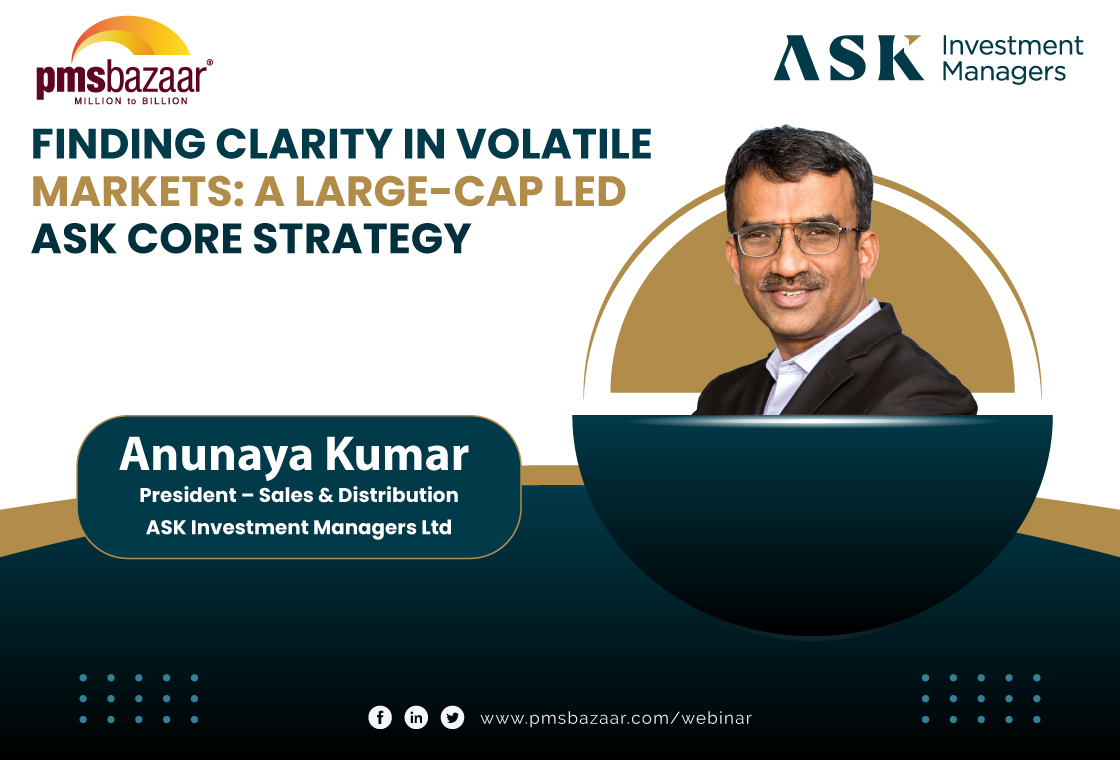
Finding Clarity in Volatile Markets: A Large-Cap Led ASK CORE Strategy
PMS Bazaar recently organized a webinar titled “Finding Clarity in Volatile Markets: A Large-Cap Led ASK CORE Strategy,” which featured Mr.Anunaya Kumar, President – Sales and Distribution ASK Investment Managers Limited. This blog covers the important points shared in this insightful webinar.
.jpg)
Passively Active Investing — A Modern Investor’s Lens on ETF-Based PMS
PMS Bazaar recently organized a webinar titled “Passively Active Investing — A Modern Investor’s Lens on ETF-Based PMS,” which featured Mr. Karan Bhatia, Co-Founder and Co-Fund Manager , Pricebridge Honeycomb ETF PMs. This blog covers the important points shared in this insightful webinar.

